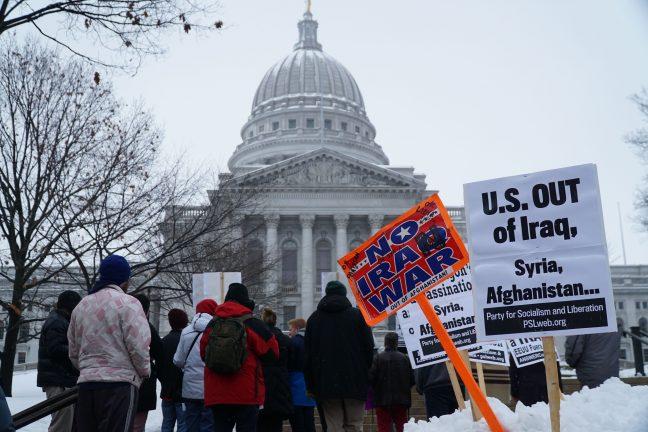Protesters gathered at the Capitol this morning to protest U.S. military action in Iran and the rest of the Middle East.
Attendees spoke out against the U.S.’s recent airstrike against Iran as well as the U.S. military history in the Middle East. Party for Socialism and Liberation Madison said this protest was a follow up to the protest Jan. 4 that was also against U.S. military occupation in the Middle East.
The protest was led by members of the PSL and had speakers from the Young Democratic Socialists of America, Teaching Assistants Association, Four Lakes Green Party, No F35’s Action Faction and others.
YDSA member Sari Hattis spoke at the event.
“Just as passionately as we partake in UW traditions such as Jump Around and rubbing Abe’s foot on Bascom, we should be striking and resisting,” Hattis said.

PSL member Sawyer Johnson said members of PSL and other organizations present at the protest want to see the money that is currently put towards U.S. wars invested into other areas, like health care and workers’ rights.
TAA member Anthony Flynn said the TAA’s Executive Board voted yesterday to support the protest.
“We echo our union’s early history of protest against the Vietnam War,” Flynn said. “We reiterate our ongoing commitment to U.S. labor against the war movement and we reassert our solidarity with the occupied, minoritized and colonized communities from Iraq to Iran, Middle East to the Midwest.”
PSL member Annika Lee said that imperialism takes many forms and that the sanctions the U.S. has placed on the Middle East can hurt people just as much as bombs and other military action. She said the U.S. government should end these actions.
Lee also said voices are more powerful when they are organized and advocated for people passionate about this issue to join an organization and speak out.

YDSA member Ari Rosenthal said students have the ability to make an impact.
“In the face of trillion-dollar war budgets, it is hard to think that small actions can make large tangible change, but it can,” Rosenthal said. “We are at UW Madison and we are students. We have a voice for change.”


